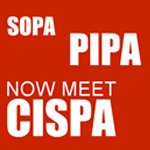
Following the SOPA/PIPA uproar that splashed across the internet earlier this year, now there is another cyber-security bill that threatens American Web browsing privacy, the Cyber Intelligence Sharing and Protection Act, otherwise known as CISPA.
The Cyber Intelligence Sharing and Protection Act (CISPA) is a United States proposed law introduced on November 30, 2011 by U.S. Representative Michael Rogers (R-MI) and 111 co-sponsors. It was passed in the House of Representatives on April 26, 2012.
The bill would allow the voluntary sharing of attack and threat information between the U.S. government and security cleared technology and manufacturing companies in an attempt to ensure the security of networks against patterns of attack; the most recent version of the CISPA bill may remove any reference to intellectual property. Several commentators have distinguished CISPA from the controversial Stop Online Piracy Act (SOPA) bill. CISPA was reported out of committee on December 1, 2011. CISPA has been criticized by advocates of internet privacy and civil liberties.
The techies clarified what makes CISPA the new SOPA. It is actually not exactly the new SOPA, as ProPublica's explainer, points out. "SOPA was about intellectual property; CISPA is about cyber security, but opponents believe both bills have the potential to trample constitutional rights." writes ProPublica's Megha Rajagopalan. But, both have to do with the way people use the internet and both threaten user privacy.
This bill has nothing to do with copyright and online intellectual property. It would do more than just shutdown your favorite overseas pirates. With SOPA, meant to censor the internet. CISPA, however, gives companies many Americans use, like Facebook and Twitter the ability to hand over your information to any government agency.
And here's where many decided CISPA was worse than SOPA. Both the Center for Democracy and Technology and the Electronic Frontier Foundation agree CISPA's language is far too broad.
Many critics don't even think the bill would make internet user safer. "Some cyber security specialists note that neither CISPA nor other cyber security bills in Congress would compel companies to update software, hire outside specialists or take other measures to preemptively secure themselves against hackers and other threats," writes. And even if it has minimal net-benefits, it's definitely not worth all the privacy we would give up, which is the ACLU's position.
That group came out with the following statement. "CISPA goes too far for little reason. Cybersecurity does not have to mean abdication of Americans’ online privacy. As we’ve seen repeatedly, once the government gets expansive national security authorities, there’s no going back. We encourage the Senate to let this horrible bill fade into obscurity," said ACLU legislative counsel Michelle Richardson after the house vote.
A day after the bill was passed in the House of Representatives, the digitized global brain Anonymous has released a video on April 27, 2012, that urges the US public to stop the CISPA in the Senate.
CISPA is supported by several trade groups containing more than eight hundred private companies, including the Business Software Alliance, CTIA – The Wireless Association, Information Technology Industry Council, Internet Security Alliance, National Cable & Telecommunications Association, National Defense Industrial Association, TechAmerica and United States Chamber of Commerce, in addition to individual major telecommunications and information technology companies like AT&T, Facebook, IBM, Intel, Oracle Corporation, Symantec, and Verizon.